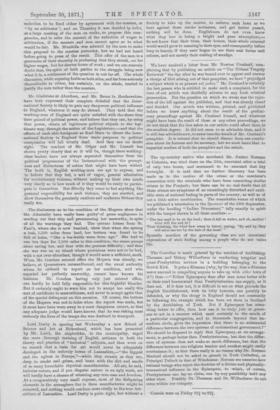The Guardian is much grieved by the conduct of Archbishop
Thomson and Bishop Wilberforce in conducting irregular and quasi-Presbyterian services in a building belonging to the Scotch Kirk. It puts a dilemma (why, by the way, does a dilemma never succeed in compelling anyone to take up with either• horn of it?) thus :—" Either Episcopacy does offer men some better aids on their road heavenward than Presbyterianism can supply, or it does not. If it does not, it is difficult to see on what grounds the English Establishment, with its lofty honours, can possibly be defended, or why the clergy in England should not constantly be following the example which has been set them iu Scotland by the Archbishop of York. But if Episcopaoy has some- thing better to offer, then how can it be truly just or gener- ous to act in a manner which most certainly to the minds of a particular congregation, and to thousands beyond that im- mediate circle, gives the impression that there is no substantial difference between the two systems of ecclesiastical government ?" We should be disposed to reply that Episcopacy, as an arrange- ment, is perhaps better than Presbyterianism, but that the differ- ence of systems does not make so much difference, but that the difference between one religious teacher and another might easily overbalance it ; so that there really is no reason why Dr. Norman Macleod should not be asked to preach in York Cathedral, or Principal 'Ulrich in that of Winchester. Nor can we conceive how rational beings who reject the doctrine of a divine and physically- transmitted influence in the Episcopate, to which, of course, Presbyterians can lay no claim, can by any possibility hold any other view. Possibly Dr. Thomson and Dr. Wilberforce do not come within our category.






























 Previous page
Previous page